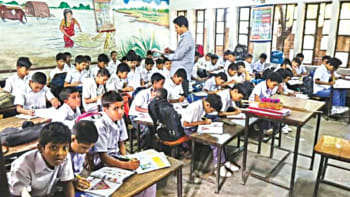A good incentive for primary students

We welcome the news of a government plan to introduce a new school feeding programme for students of all state-run primary schools starting July. According to a report by this daily, the primary and mass education ministry is set to complete a feasibility test for the mid-day meals project this month, and will start preparing a Development Project Proposal in March. Feeding programmes for government schools have existed in various forms since the country was liberated. They have always been an important part of the school system, ensuring that students not only consume a chunk of their required daily calories in school, but also stay at school.
As per data of the primary education ministry, attendance rose by 6.6 percent and dropouts fell by 6 percent in schools covered by the last government feeding programme (which ended in June last year). However, given the patchy track record of the planning and implementation of government feeding programmes, we also feel the need to be cautious in our optimism.
One may recall that the last proposed large-scale school meal project had made headlines for all the wrong reasons. In August 2020, the primary and mass education ministry had proposed a Tk 17,290 crore undertaking to feed 1.41 crore students of 65,566 government primary schools for five years. Controversy arose when the planning commission identified several unnecessary expenses in the proposal. The allocation for foreign trips by officials to cook khichuri – or as in the ministry's words, to "gather knowledge about implementation of mid-day meal programmes at schools" – was criticised. The proposal was ultimately rejected by the Executive Committee of National Economic Council (Ecnec) headed by the prime minister. But it now stands as an example of how important projects like school feeding programmes can be derailed due to bureaucratic inefficiencies and mismanagement. This, we hope, will not happen with the latest feeding project under consideration.
It is also crucial that the new programme is implemented as soon as possible. The government's last school feeding programme ran from 2010 till June 2022, under which the authorities provided 75 grams of fortified biscuits to nearly 3 million schoolchildren in 104 upazilas. But it has already been almost eight months since public school students have been deprived of free meals provided by the government. This cannot go on – especially at a time when difficult Covid recovery and global inflation have strained the economy, making dropout seem like an unavoidable choice for many poor students and households.
We urge all relevant authorities to come up with a proposal for the mid-day meals programme that will be sensible. A speedy and efficient implementation is key to ensuring that students, especially in the most poverty-stricken areas of the country, will not only receive proper nutrition but also will stay focused in school.

 For all latest news, follow The Daily Star's Google News channel.
For all latest news, follow The Daily Star's Google News channel. 





Comments